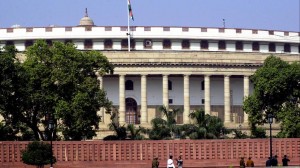A lady and an officer
 Durga Shakti Nagpal, a young officer in the Indian Administrative Services (IAS), was suspended by the government of Uttar Pradesh in north India on July 27. She was accused of risking communal tension by ordering the demolition of the wall of a mosque being built illegally on government land at a village in Greater Noida, close to India’s capital, New Delhi. Amid allegations that she was punished for going after the state’s powerful sand mafia, the president of India’s ruling Congress party, Sonia Gandhi, asked the Prime Minister to ensure that the officer was not unfairly treated. On my insistence, another young female officer working with the government agreed to share her personal experiences with me, but only on the condition of anonymity. Her attitude probably reflects the fear of the consequences she might face if she speaks openly.
Durga Shakti Nagpal, a young officer in the Indian Administrative Services (IAS), was suspended by the government of Uttar Pradesh in north India on July 27. She was accused of risking communal tension by ordering the demolition of the wall of a mosque being built illegally on government land at a village in Greater Noida, close to India’s capital, New Delhi. Amid allegations that she was punished for going after the state’s powerful sand mafia, the president of India’s ruling Congress party, Sonia Gandhi, asked the Prime Minister to ensure that the officer was not unfairly treated. On my insistence, another young female officer working with the government agreed to share her personal experiences with me, but only on the condition of anonymity. Her attitude probably reflects the fear of the consequences she might face if she speaks openly.
After you joined as an officer in the Indian government was everything just the way you had imagined it to be or it was different?
When we become officers, we realize how reality is completely different from what we were taught or how we had perceived it so far. We come across a situation where corruption is not considered a crime, but a justifiable necessity. It is possible to stay clean even then, but at great personal discomfort. The first two or three years are spent in familiarizing oneself with the way the system works, but it is possible and there are examples of doing justice to the job within the restrictions which I have mentioned above.
In India, the situation of women is always a debatable topic, the way they are looked upon, how society treats them and so on. You must have seen a different side of society, being an officer?
Being a lady officer and despite my high rank, some of my male subordinates considered it less dignified to take orders from a woman. Though such people are now diminishing in number, they still exist. An officer can work only in cooperation with his or her team and an insubordinate staff does create problems in the smooth functioning of the office.
So you are disappointed.
I won’t say that there was any disappointment with the system as such. The only illusion which was wiped out after coming into field was that I would have unrestrained power to make good things happen. In the field, there are rules and other factors which have to be taken into consideration before doing any good to society. The system is in place but without the proper and correct movers it is not possible to achieve anything. The system is perfectly objective but those who run or manage it are not.
How has your personal experience been so far? Have your decisions been influenced ever by any political or other pressures?
Yes I have taken decisions under those pressures, but those were not against the public as such, they were only against my personal discretion. As far as my personal experiences are concerned, my decisions are based upon rules and exigencies. It is a completely different matter that these exigencies might be personal as well. There are officers who respect an honest officer and support him or her, but there are bosses who do not.
What do you think about Durga’s case?
As far as Durga’s case is concerned, no person is capable of explaining the situation and the rationale behind the decisions she made better than Durga herself. The issue is still under investigation and commenting about it until the facts get established would be futile. Nevertheless, the way she has been suspended or the ways our political bosses are reacting to her actions have in no way deterred any honest or righteous officer from doing what should be done.
Do you ever think about what you might have faced, had you been in her situation?
It does make me feel concerned about the consequences of my action, but the Constitution of India has been very fair to civil servants. We may be suspended or transferred from our area of duty but it is very difficult to remove us from the government.
So after spending almost four years as an Indian administrative officer what do you think is the mantra to survive in the system and remain clean?
Sorry, I cannot answer that question.
Interview: Samrah Fatima
Editor: Manasi Gopalakrishnan






